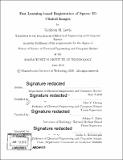| dc.contributor.advisor | John V. Guttag and Adrian V. Dalca. | en_US |
| dc.contributor.author | Lewis, Kathleen M.(Kathleen Marie) | en_US |
| dc.contributor.other | Massachusetts Institute of Technology. Department of Electrical Engineering and Computer Science. | en_US |
| dc.date.accessioned | 2019-10-11T22:11:17Z | |
| dc.date.available | 2019-10-11T22:11:17Z | |
| dc.date.copyright | 2019 | en_US |
| dc.date.issued | 2019 | en_US |
| dc.identifier.uri | https://hdl.handle.net/1721.1/122546 | |
| dc.description | Thesis: S.M., Massachusetts Institute of Technology, Department of Electrical Engineering and Computer Science, 2019 | en_US |
| dc.description | Cataloged from PDF version of thesis. | en_US |
| dc.description | Includes bibliographical references (pages 37-40). | en_US |
| dc.description.abstract | We introduce SparseVM, a method to register clinical 3D MR scans faster and more accurately than previously possible. Deformable alignment, or registration, of clinical scans is a fundamental task for many medical image applications such as longitudinal population studies. Most registration algorithms are designed for high-resolution research-quality scans, and under-perform when applied to clinical data. Clinical scans present unique challenges because, in contrast to research-quality scans, clinical scans are often sparse, missing up to 85% of the slices available in research scans. We build on a state-of-the-art learning-based registration method to improve the accuracy of sparse clinical image registration. We evaluate our method on both a clinically-acquired MRI dataset of stroke patients, and on a simulated sparse clinical scan dataset. SparseVM registers MR scans in under a second on a GPU, which is over 1000 x faster than the most accurate clinical registration methods, without compromising accuracy. SparseVM has statistically significant improvements in runtimes over all baselines, and a statistically significant improvement in accuracy over the fastest baseline. Because of these contributions, SparseVM enables clinical analyses that were not previously possible. Our code is publicly available at voxelmorph. mit . edu. | en_US |
| dc.description.statementofresponsibility | by Kathleen M. Lewis. | en_US |
| dc.format.extent | 40 pages | en_US |
| dc.language.iso | eng | en_US |
| dc.publisher | Massachusetts Institute of Technology | en_US |
| dc.rights | MIT theses are protected by copyright. They may be viewed, downloaded, or printed from this source but further reproduction or distribution in any format is prohibited without written permission. | en_US |
| dc.rights.uri | http://dspace.mit.edu/handle/1721.1/7582 | en_US |
| dc.subject | Electrical Engineering and Computer Science. | en_US |
| dc.title | Fast learning-based registration of sparse 3D clinical images | en_US |
| dc.title.alternative | Fast learning-based registration of sparse three-dimensional clinical images | en_US |
| dc.type | Thesis | en_US |
| dc.description.degree | S.M. | en_US |
| dc.contributor.department | Massachusetts Institute of Technology. Department of Electrical Engineering and Computer Science | en_US |
| dc.identifier.oclc | 1122563949 | en_US |
| dc.description.collection | S.M. Massachusetts Institute of Technology, Department of Electrical Engineering and Computer Science | en_US |
| dspace.imported | 2019-10-11T22:11:16Z | en_US |
| mit.thesis.degree | Master | en_US |
| mit.thesis.department | EECS | en_US |
